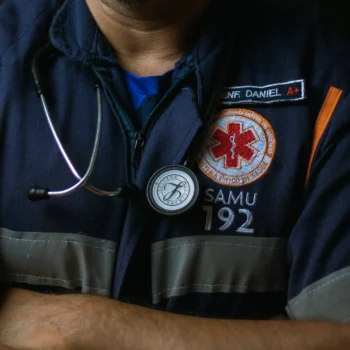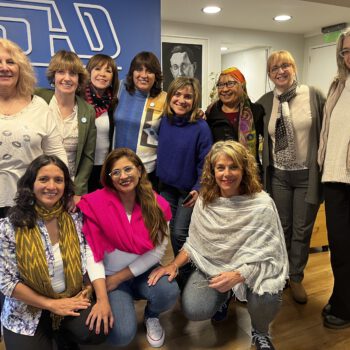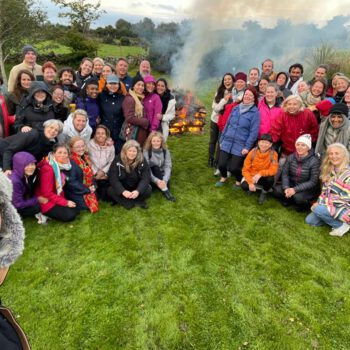Desirée’s passion for the development of healthy cooperation in people-centered organizations took her from medicine to coaching, mediation and training. Her healthcare perspective is viewed through the lens of a doctor, a healthcare manager, and medical communication teacher. In addition to directing the EFT (Emotionally Focused Therapy) Netherlands foundation, she developed EFT courses, including Emotionally Focused Mediation and Relationship Coaching.
This is a short edited excerpt of Desirée’s interview and perspectives on the healing potential of collaboration and communication, at work and at home. Hear her full interview on The Gifts of Trauma Podcast.

I’ve been a doctor, a healthcare manager and a medical communication skills teacher. I’d survived internships, moving to a different place every six or eight weeks, but still, my first job in a hospital was overwhelming. I saw medical professionals getting sick and burned out. It was really difficult to have important conversations. I recall the parents of a two year-old who nearly drowned. They wanted to speak with their specialist and had to wait until 7:00 pm. The care I wanted to give had to be provided after working hours. Surely this is not healthy? So I started to doubt myself. Was I too sensitive? Could I work in this system? Can I fulfill my five year-old dream of being a doctor? It was so disappointing to get inside the medical system and realize it was in such a poor state of health.
I chose to stop practicing medicine early in my career and focus on teaching medical communication skills. Today I’m an independent consultant, mediator, individual and relationship coach, and a teacher/trainer for the Netherlands Emotionally Focused Therapy (EFT) Foundation. I’m still inspired to make healthcare more healthy for the people who work there. I also have a mission to create healthy systems in organizations, to help people work together in healthy ways. Whether it’s a collaboration amongst parents, between medical professionals, corporate teams or the collaboration of an individual with their own essence… it’s all within the scope of my mission. Combining all of these roles that I enjoy with being a single mom is an interesting challenge, every day.
One of the organizations I consult to is TalentCare, which attracts lots of doctors who are, like me, disappointed in healthcare. In a way I represent them, as after everything they went through to become a doctor, they often have low self esteem and doubts about themselves, their futures or what to do. When we work together, they tell me they feel seen as human beings within the healthcare system.
I believe that seeing someone as a human being and being able to understand difficult behavior as fighting for connection with others or yourself (because social isolation causes primal panic) offers so much space for our mutual humanity and self compassion. My approach goes back to the primal human needs of being seen, heard and understood. Even if you cannot cure people or change a situation, there’s a lot you can do. You can truly see people, and you can meet them where they are. That’s a lot. It’s so basic and simple, yet it’s also very difficult because we think, as healthcare professionals or doctors, we need to fix, heal, to do all kinds of things. And yet we all recognize genuine sincerity and interest. So if you bring empathy, you can say or ask anything because people truly appreciate it.
Communication is not only about communication with yourself and others, but also about yourself as an instrument of communication. Insight into the functioning of your own neurology and its impact on your own [automatic] behavior and the emergence of common patterns is essential.
Most of us have good intentions. And while it’s rarely our intention, our behaviors can negatively impact others. We feel the pressures of performing and responsibility. I help people release the guilt, or de-guilt-ify, that’s really what validation does. They’ll exhale and say, “Oh, I didn’t have the inside perspective on what was going on while I was doing this, but now that I know, I can be aware and change that behavior.”
A few years ago I split up with the father of my 11 year-old son. It’s been a really intense process, and not a matter of choice. I knew staying would cost me my health and I had to maintain my own health to take care of my son and to collaborate with his father on his upbringing.
This is one of many reasons I chose to do the Compassionate Inquiry professional training. Many traumatic events happened when our child was young, and before he was born. His father and I dealt really differently with pain. We could not find one another in the pain. We had different needs and there was less and less space to connect. We had to move on because this little guy was with us. It was a difficult challenge, but sometimes when people have current and past trauma, which was the case in my situation, it gets all mixed up, and it seems so big.
We didn’t decide the ‘who gets what’ questions when we split up, but about eight months later, when it was quieter. It was a good decision as I have often heard since, from GPs, and people I meet after they go through divorces where they felt forced to comply, that they had health problems and issues related to grief and everything that happened in their break-up. It’s difficult to impossible to take care of everything that needs our attention at that time, ourselves most of all.
One of the skills Terry Real teaches is how to cherish your partner in the relationship and stand up for yourself at the same time. He says almost no one knows how to do this, and I relate to this personally, as it was my challenge.
But after all the pain and everything that happened, I still genuinely wanted my son’s experience to be that love never stops; only the shape of it changes. I can always keep loving myself, my ex and our son, because love will never stop. This understanding really kept me going through our break-up. Our son knows we’re still a family. Yes, we have different houses, but we are family. We’re going on holiday next week, the three of us, and we still celebrate some festivities as a family. It can be difficult, but it’s not about my needs, it’s about something more important. It helps me stay truthful to myself, because if I stop loving, I stop being me. And that’s not an option.
The Gifts of Trauma is a weekly podcast that features personal stories of trauma, transformation, healing, and the gifts revealed on the path to authenticity. Listen to the interview, and if you like it, please subscribe, leave a rating or review, and share it with others in your community.



